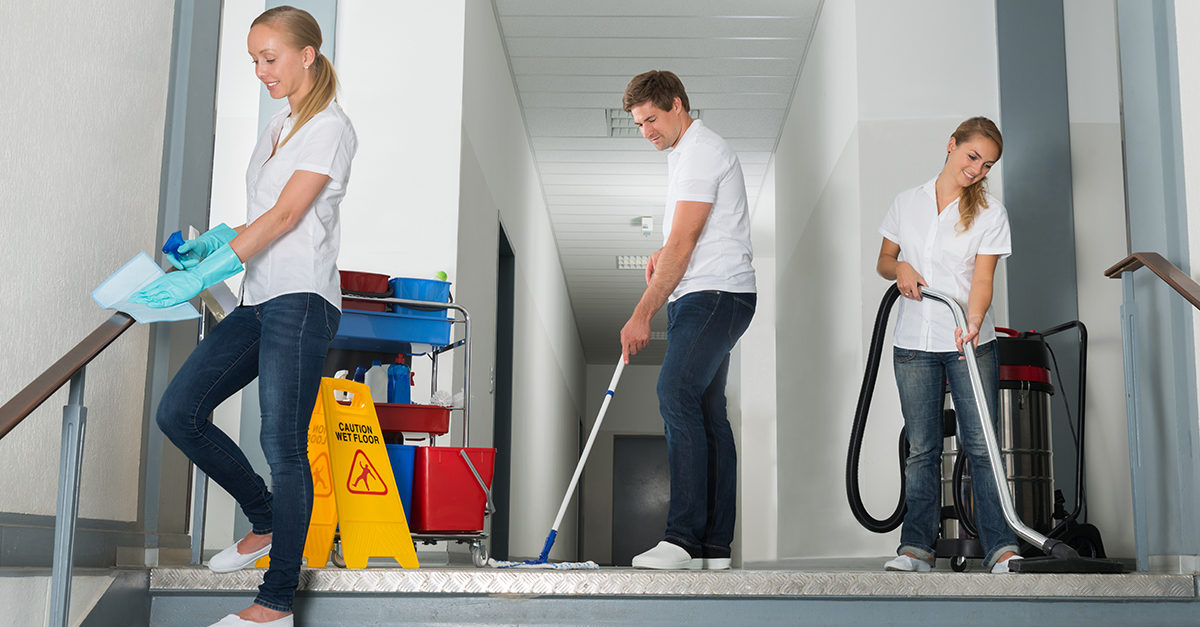Every organization has assets to protect, and the custodial team generally provides the first line of defense. Whether contractors or in-house staff perform the custodial work, these team members are critical to the organization’s success in various ways. Ensuring that your custodial team members are well-trained enables them to fulfill important responsibilities.
The best organizations recognize the importance of investing in employee development, viewing this investment as a strategic tool for delivering business results, rather than a detriment to the bottom line. In fact, the most successful organizations spend almost 3 percent of their budget on training to ensure staff members are up-to-date on the trends and technology in the industry that will be most helpful when performing their duties. This training is especially important when a profession undergoes transformational change, such as the cleaning industry’s current focus on sustainability, the use of environmentally friendly cleaning products, and the decreasing reliance on chemicals. A well-trained custodial team knows what to do, why they are doing it, and how best to take care of the facilities.
The following are the top five ways that a well-trained custodial team will enhance your business.
1. Safety
The safety of your staff, guests, visitors, customers, and vendors depends on your custodial team; they are the eyes and ears of your organization. They also are the most aware when something is not right and/or presents a potential hazard to the facility’s users. For example, when a custodial team member cleans up a spill, the likelihood of an injury or lawsuit—or both—decreases. Although it may be challenging to try to quantify something that may never happen, organizations are well-advised to pay attention to possible outcomes that may result in injury; loss of life; or redirection of organizational assets, such as the resources needed to prevent or settle a lawsuit. By keeping your facilities clean and free from potential hazards, you can safeguard organizational assets and keep investing in the business.
2. Appearance
If customers or guests visit your organization, you already know the importance of appearance. When a customer has the choice between doing business in a pleasant, clean, orderly environment or a shabby, disorganized, dingy environment, it should not be a surprise that the better the appearance, the greater the likelihood that the customer will choose that business over another. Think about schools, malls, hotels, stores, commercial office buildings, manufacturing centers, factories, and hospitals. Each of these business categories understands that the appearance of a facility is important and has a direct impact on the customer or guest experience, as well as the credibility of an organization.
The Smithsonian Institution has more than 30 million visitors each year, and, according to Nancy Bechtol, director of Smithsonian facilities, “The second someone steps on the curb near one of our facilities, a first impression is being made. Our building service team is the key to controlling whether our visitors will have a good first impression.”
3. Health
It would be easy to focus only on appearance, but that would be shortsighted. Organizations and businesses must also consider the impact of the health and hygiene of their enterprise on customers, visitors, staff, vendors, and guests.
Hospitals, restaurants, and cruise ships are certainly aware of the potential impact of less-than-optimal hygienic conditions, as are schools and food processing plants. Between 2012 and 2014—the most recent data available—the U.S. Department of Agriculture recorded more than 2,500 outbreaks of foodborne illnesses in the United States, which resulted in thousands of hospitalizations and dozens of deaths. The potential for illness does not only exist in food processing facilities and restaurants; the hygiene of a facility can also influence the potential for infections or reactions related to numerous viruses or bacteria, such as norovirus, salmonella, H1N1, or Listeria, as well as adverse reactions to chemicals that may be used in cleaning or preparing a facility.
4. Efficiency
When considering the level of cleanliness in an organization, one must consider a number of issues to develop the most efficient cleaning processes. These include:
- The number of staff members
- The type of equipment they will use for cleaning
- The importance and frequency of scheduled cleanings
- The amount of detail to be included in each cleaning
- The timing of the cleanings.
For example, in an office building that is primarily occupied during the day, it might be ideal to have a robust night cleaning crew working on a schedule of planned maintenance and a small day crew to react to unforeseen situations.
It is also important to consider equipment and product storage in relation to the areas that need cleaning. It would be highly inefficient to store the equipment needed to clean heavily trafficked carpeted areas either off site or in areas such as a loading dock or basement. Consider what is involved in moving equipment and products to the area that requires them, and make certain that they are stored close to—if not adjacent to—that area. Not only will your team save time, they will also get their work done more quickly and efficiently, and it will be physically less stressful for them.
Another aspect of efficiency is standardization, which translates into “consistency in cleaning and appearance.” You should not worry that some portions of your facility will be spotless while other portions are less pristine. A successful organization uses third-party standards, and a well-trained custodial team understands those standards and how critical they are to fulfilling its responsibilities to the organization.
5. Organizational Success
The custodial team makes tremendous contributions to organizational success. Generally, the frontline team ensures facilities are clean and safe.
In most organizations, members of the custodial team are the unsung heroes who make good things happen every day. They often quickly respond to emergencies; they know better than anyone how to keep an organization safe and the doors open so that productivity can continue. They also provide benefits that are readily apparent to everyone who uses the facility, including cleanliness, good indoor air quality, and a pleasant, professional appearance.
A well-trained custodial team also provides benefits to the bottom line of the organization by facilitating continued productivity. Regardless of the organization’s role—health care, manufacturing, retail, commercial, or academic—each one shares the basic premise of controlling costs to either maximize profit or serve the greater good.
Investing in employee training forms one of the foundations of organizational success and solid business performance. By providing training, the right equipment and supplies, and a good working environment that acknowledges the team’s critical contribution to organizational success, you can position your organization for productivity and prosperity.



